On July 13, the International Olympic Committee (IOC) will make its final decision on which city will host the 2008 Olympic Games. The three front-runners—Beijing, Paris and Toronto—are all worthy of the honor. Of course the IOC has its own criteria in making this choice. But for those IOC members who are voting with politics and foreign policy in mind, the choice should be clear. Without prejudice to the other two contenders, it is fair to say that the greatest and most positive political and foreign policy outcome might result from giving the nod to Beijing. But such motivations to vote for Beijing need to be realistic: some positive outcomes are possible, and even likely, but let’s keep our expectations low.
Should Beijing win the bid, one of the first concerns of the national security apparatus will be to bolster its ability to assure a highly secure Olympiad, and rightly so. However, the Chinese security forces are not at all trained in a culture of “rights”, but understand brute force best of all. It is more likely in the run-up to the games that such parts of the Beijing regime will be all the more prone to abuses in the name of “security” and smooth-running games. The Chinese authorities have never shown themselves to be particularly comfortable with the notion of large, unregulated gatherings of thousands upon thousands of people on the streets—let alone when vast numbers of them are foreigners—and that wariness is unlikely to change in the coming years. Perhaps governments around China which have had experience in holding Olympics—such as in Seoul and Tokyo—may consider consulting with Beijing on questions of Olympic security in a way that will help assure safe games while also introducing concepts of policing which are tolerant of legitimate rights of law-abiding citizens. We should not be quick to assume that simply holding the games will lead to a more tolerant security apparatus in Beijing.
A second consideration is on the foreign policy front. A number of observers, especially in the United States, suggest that if Beijing gets the Olympic bid, China will be less inclined to pursue a confrontational foreign policy in the years running up to 2008. According to this logic, Beijing would fear inviting international opprobrium and even Olympic boycotts (such as when the United States and others boycotted the Moscow games following Russia’s invasion of Afghanistan). This view has a particular application relations across the Taiwan Strait: in the years before the Olympics, China would be restrained and not use force to settle its differences with Taiwan.
Overall this analysis stands up, but at the same time should not ignore that China (and most of the world, officially speaking) sees cross-Strait relations as an internal affair, not subject to international scrutiny. We should be cautious too that China not act pre-emptively shortly after getting the nod from the IOC, in hopes that by 2008, the world’s short memory would forget unaccepatble provocations committed years before. Chinese neighbors from around the region should strongly encourage Beijing to find ways to include Taiwan in some form of Olympic planning, and perhaps even to stage some events on Taiwan.
Finally, many observers like to point to the important impact the 1988 Seoul Olympics had on bringing positive political change to South Korea, and suggest a similar outcome for China. But, this parallel needs to be examined far more closely. The Republic of Korea in 1988 was much farther along the path of economic, political, and social freedoms than China is today, and had a far larger proportion of highly educated, increasingly influential, urban elites in its population than China has today. In China today, not even a semblance of a viable opposition movement exists, and not even a single Kim Daejung-like figure has emerged on the Chinese political scene where the Chinese Communist Party holds a dominant and monopolizing grip on any significant political activity. True, some greater democratization may arise in China in the coming years, to then reach full flower in the wake of the 2008 games. But this seems highly unlikely, and we should keep our expectations low. Holding the games in China will no doubt have a positive and pluralizing effect on opening that country and its society, but the Chinese Communist Party will struggle mightily to stay in place, and will certainly point to the games as a factor to legitimize and sustain their continued monopoly on political power.
In the end, if we want to judge principally on the basis of fostering positive political and foreign policy developments in China, then Beijing should get the nod. But to avoid disappointment and recriminations later, interested observers need to be realistic. Positive change in China will not happen simply with the wave of the Olympic wand. Outside institutions and governments will need to work conscientiously with like-minded counterparts in China, and through the Olympic process, to foster the kinds of change in that country that such a major international event promises to bring.


Commentary
Op-edOlympics Should Be in Beijing, But Lower Expectations
July 1, 2001